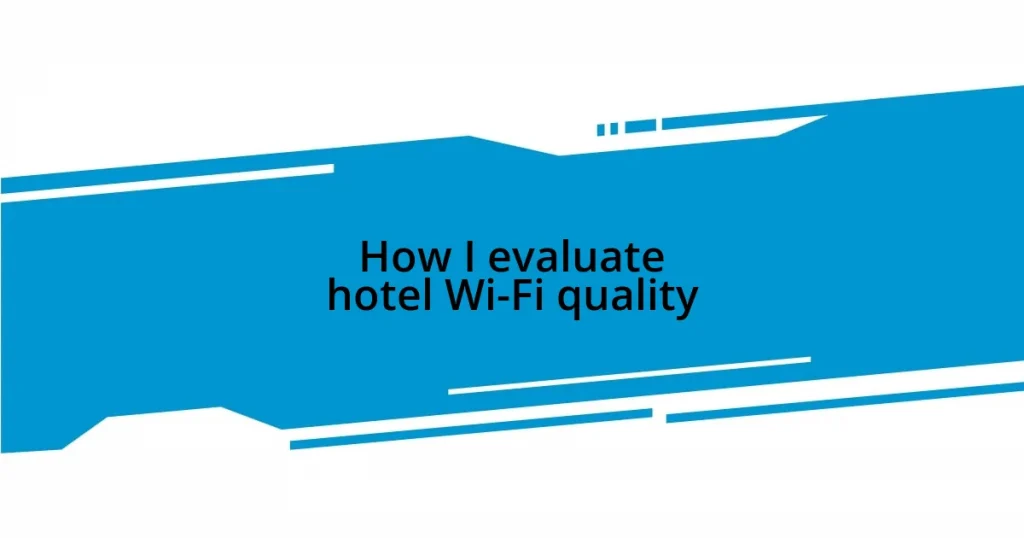Key takeaways:
- Hotel Wi-Fi is essential for both personal and business travelers, influencing their overall experience and satisfaction during stays.
- Key factors affecting Wi-Fi quality include bandwidth, signal strength, network infrastructure, and the number of concurrent users.
- Using tools like Speedtest and Wi-Fi Analyzer helps assess Wi-Fi performance and connectivity issues in hotels.
- Customer feedback provides valuable insights into actual Wi-Fi experiences, highlighting the importance of reliable service for various travel needs.
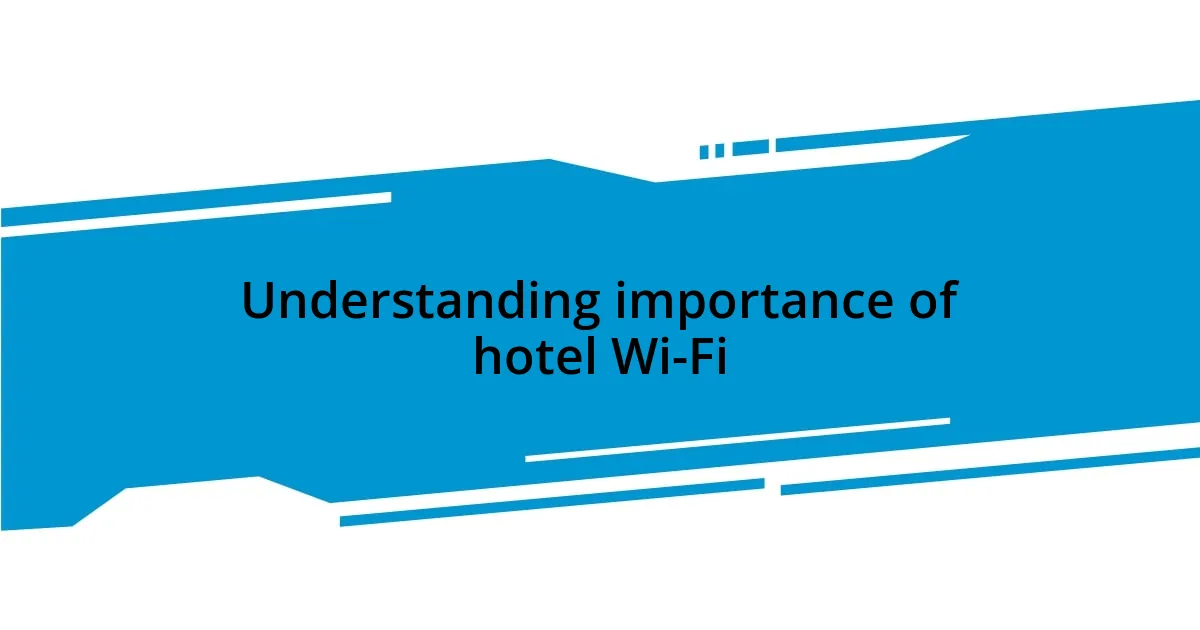
Understanding importance of hotel Wi-Fi
When I think about staying in a hotel, Wi-Fi isn’t just a luxury—it’s a necessity. Imagine arriving after a long trip, only to find that the Internet connection is painfully slow or completely unavailable. It’s frustrating and can really impact the overall experience. Have you ever had to scramble for cell service just to check your emails? That feeling of disconnection can take away from your travel enjoyment.
In my experience, good hotel Wi-Fi can make all the difference. Whether I’m coordinating plans with friends or trying to stream a movie after a long day, reliable Internet keeps me connected to the world. It’s like having a slice of home while I’m away. I remember one trip when I was unexpectedly called into a work meeting, and the quality of the hotel Wi-Fi allowed me to join without a hitch. That relief was priceless!
Moreover, in today’s digital age, the importance of hotel Wi-Fi extends beyond just personal use. If a hotel wants to cater to business travelers or digital nomads, having robust Wi-Fi can significantly influence their decision to book a room. Wouldn’t you choose a place that ensures you can stay productive or unwind after a busy day? A strong Wi-Fi signal can enhance a hotel’s reputation and keep guests coming back for more.
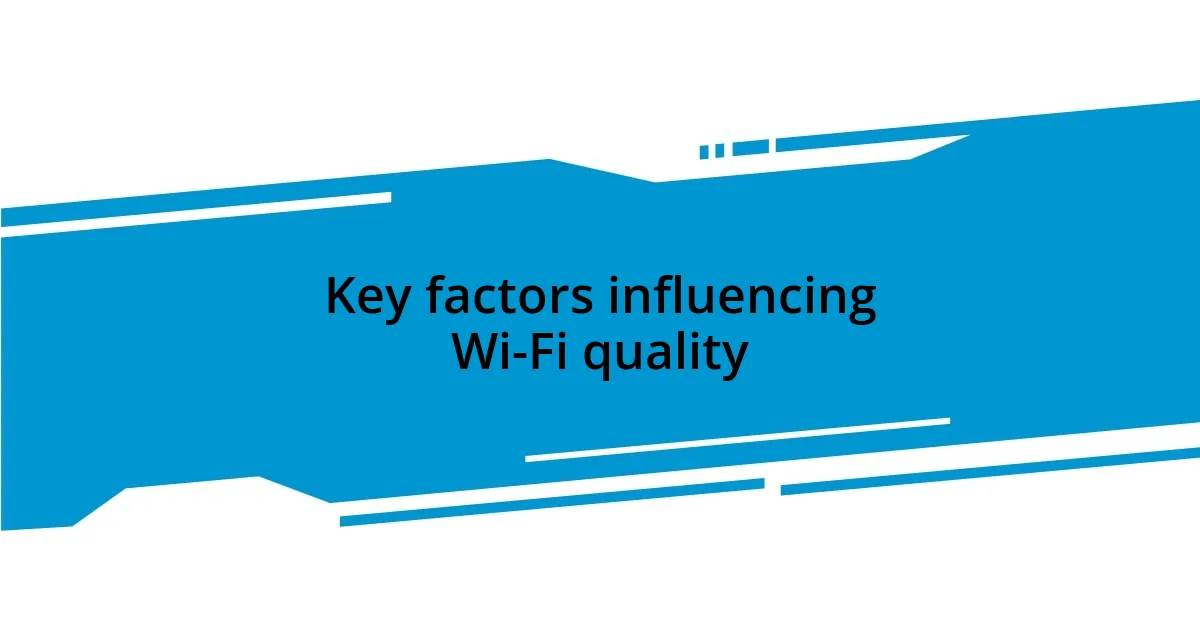
Key factors influencing Wi-Fi quality
When evaluating hotel Wi-Fi quality, several key factors come into play. The speed of the connection is perhaps the most obvious but often overlooked aspect. During a recent stay in a bustling city, I was pleasantly surprised by the high-speed Wi-Fi at my hotel, which allowed me to download large files effortlessly. In contrast, I’ve also faced painfully slow networks that felt like a blast from the past—something I’d rather avoid on my travels.
Here are the key factors influencing Wi-Fi quality:
- Bandwidth: The amount of data the network can handle. More users require more bandwidth.
- Signal Strength: How strong the Wi-Fi signal is in different areas of the hotel. Stronger signals lead to a better experience.
- Network Infrastructure: The technology behind the Wi-Fi setup, including routers and access points. Quality equipment produces better results.
- Concurrent Users: The number of users connected at the same time. Too many users can slow down the network significantly.
- Location: Proximity to the router or access point can make a huge difference. A room far from the source often suffers connectivity issues.
Understanding these factors can help in making an informed judgment about the Wi-Fi quality a hotel offers.
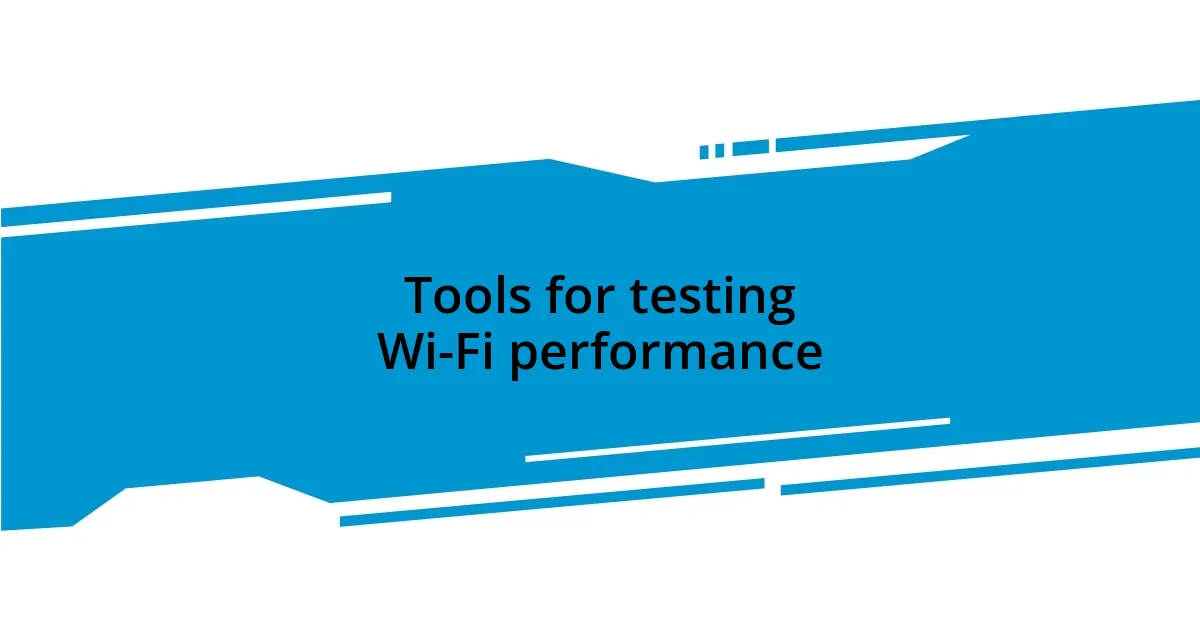
Tools for testing Wi-Fi performance
When it comes to testing Wi-Fi performance, I find various tools incredibly helpful. One of my go-to options is Ookla’s Speedtest app. It provides quick and accurate readings of download and upload speeds, along with ping times. I remember staying at a hotel where I thought the Wi-Fi would be fine, but the Speedtest results revealed unexpectedly slow speeds, prompting me to ask for a room change.
Another effective tool is Wi-Fi Analyzer, which helps identify signal strength and channels. I once used it in a busy hotel conference room, and to my surprise, it showed that a nearby network was causing interference. By switching to a less crowded channel, I was able to improve my connection significantly. These tools, combined with personal experience, have taught me how to navigate Wi-Fi situations during my travels.
Lastly, I can’t overlook the importance of a simple laptop or smartphone’s built-in diagnostic tools. They allow me to observe real-time performance and troubleshoot connectivity issues. I recall a trip where my laptop indicated weak signal strength; simply relocating to a cozier corner of the lobby made all the difference. Each tool has its unique strengths, and using them together gives me a comprehensive picture of a hotel’s Wi-Fi quality.
| Tool | Description |
|---|---|
| Speedtest | Measures download/upload speeds and ping times. |
| Wi-Fi Analyzer | Assesses signal strength and channel interference. |
| Built-in Diagnostics | Offers real-time performance metrics and troubleshooting. |
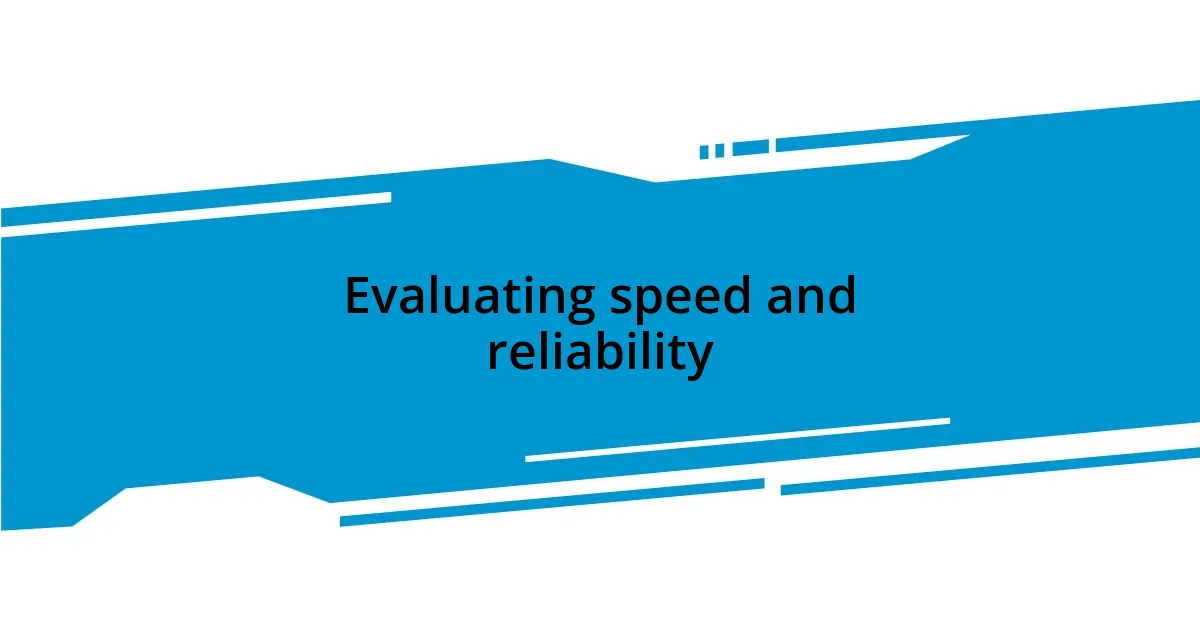
Evaluating speed and reliability
To truly grasp the speed and reliability of hotel Wi-Fi, I often find myself running a quick test as soon as I check in. On one occasion, I was in a lovely resort and eager to stream my favorite show. Momentarily, I held my breath as I clicked the Speedtest app; thankfully, the results came back stellar. It felt like my worries melted away with those high numbers. But let’s be honest—what happens when you face disheartening lows? I’ve stood in a dimly lit room, phone in hand, frustrated with repeated failures. It makes you wonder, is it the infrastructure, or am I just too far from the router?
Reliability goes hand in hand with speed, and I find a stable connection often speaks volumes. For instance, during a work trip, I needed to video call my team. The first few minutes were filled with pixelated faces and awkward silences. It was as if we were all stuck in tech limbo. But once I moved closer to the router, the video smoothed out, and the conversation flowed. Have you ever had an experience where your location completely changed your Internet fate? It’s fascinating how just a few steps can make such a difference.
I also consider how many concurrent users might be swimming in the same digital pool. I remember one specific night in a bustling hotel filled with conference-goers. As everyone logged on, I felt the connection buckle under the pressure. I wondered if any of them had thought to use a personal hotspot instead. Managing interactions and limiting distractions became essential, especially as those important emails waited for my attention. It’s moments like these that remind me of the fragility of shared connections.
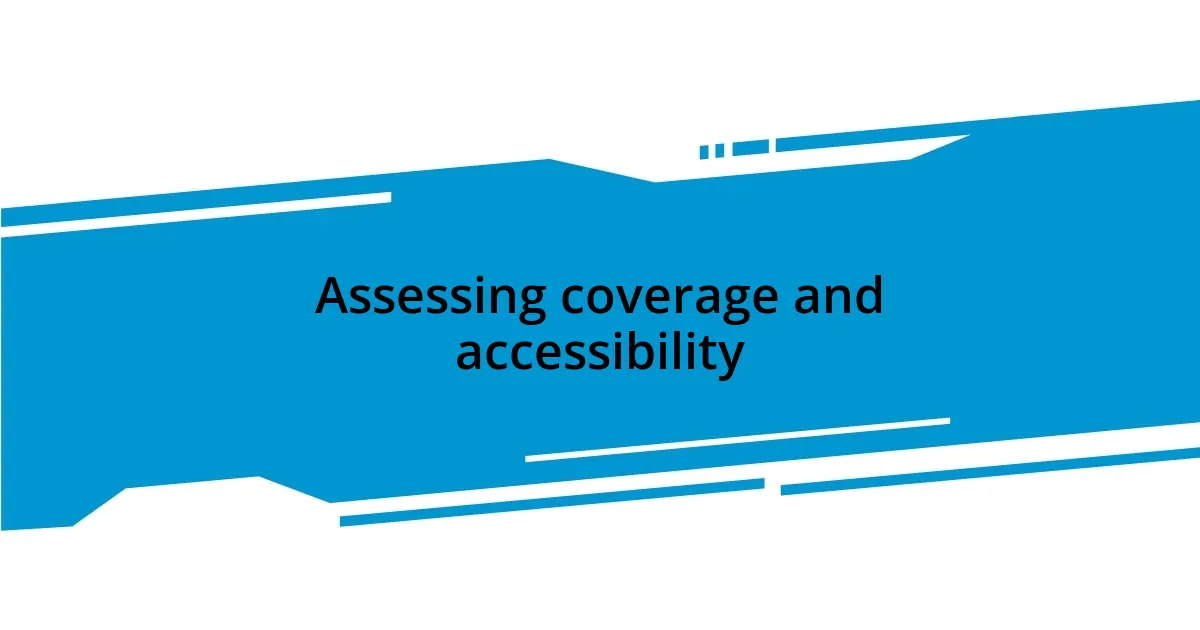
Assessing coverage and accessibility
When I evaluate hotel Wi-Fi coverage, I always make it a point to roam around the property. Once, while checking into a charming boutique hotel, I noticed that the coverage in the lobby was excellent, but my room’s far corner seemed like a Wi-Fi black hole. I often ask myself, how many guests have settled down only to face a frustratingly weak signal? Relocating to the middle of the room felt like a mini-adventure, but I was grateful for the lesson learned about exploring different areas.
Accessibility is another crucial aspect I can’t overlook. There have been times when I entered a hotel room only to realize the signal dropped significantly, especially near those ornate grand windows. When I think about it, I can’t help but feel a bit of concern for those who might rely on a steady Internet connection for work or personal matters. It’s unsettling to imagine having important emails hanging in the balance because of one questionable spot. Have you ever been in a similar situation, feeling tethered to that one sweet spot for connectivity?
Finally, I often consider how easy it is for guests to get support when facing coverage issues. In one hotel, the staff was proactive, offering quick solutions to guests facing connectivity setbacks. It left me wondering—the readiness of a hotel to assist speaks volumes about their commitment to guest experience. Have you ever experienced stellar service in times of trouble? I certainly remember feeling relieved when help was just a phone call away, turning what could have been a frustrating experience into a simple fix. Such attentiveness can make all the difference in how I evaluate a hotel’s Wi-Fi quality.
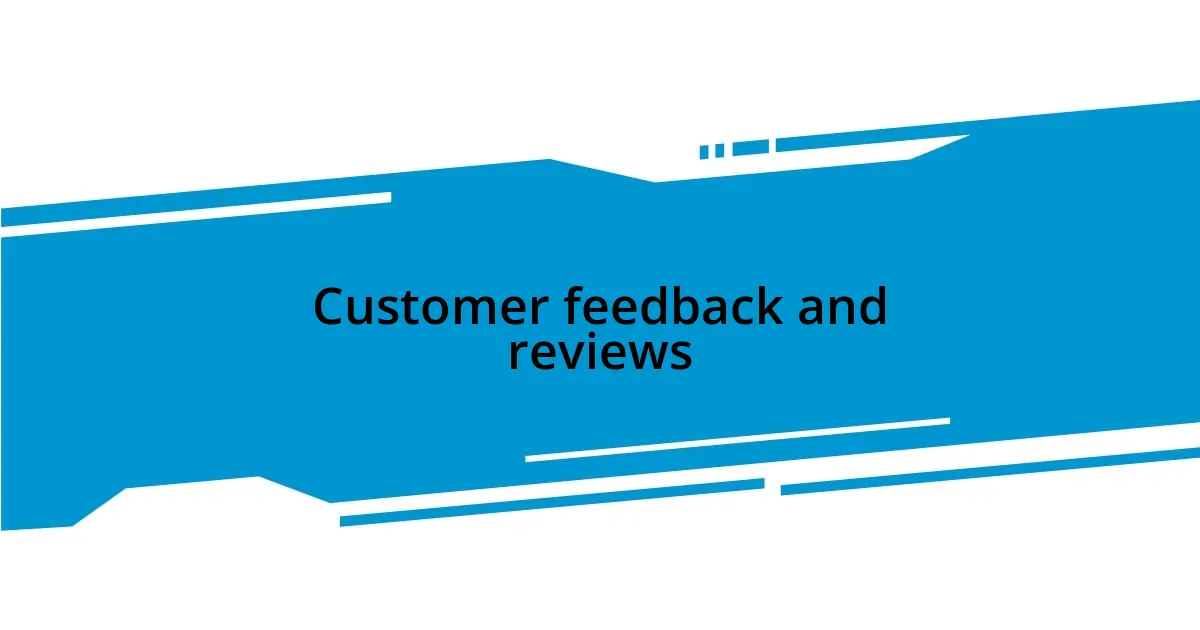
Customer feedback and reviews
It’s always fascinating to dive into customer feedback and reviews when assessing hotel Wi-Fi quality. The real stories often lie within those testimonials, revealing the experiences that numbers alone can’t convey. I remember reading a review from a fellow traveler who was eager to post holiday updates but found herself grappling with connection drops during peak hours. It struck me—how often do we overlook the impact of shared networks on our stay?
Reviews can serve as a treasure trove of insights, offering glimpses into how Wi-Fi performs in various situations. Just the other day, I stumbled upon a comment from a business traveler who highlighted not just speed, but also the dedication of the staff. They mentioned how someone went out of their way to ensure their connection issues were addressed promptly. It made me think, isn’t it refreshing when a hotel goes beyond just providing Wi-Fi and invests in customer satisfaction during tech mishaps?
There’s something uniquely telling about guests sharing their frustrations after a stay. I recently encountered a review that described wrestling with slow internet while trying to attend a crucial online conference. The sheer anxiety and disappointment absolutely came through in their words. It’s moments like these that emphasize the gravity of reliable Wi-Fi; it’s not merely a convenience but often a necessity for travelers. Have you ever experienced that sinking feeling, trapped between important work and an unreliable connection? I know I have, which is why I really pay attention to what others have to say.

Final tips for choosing hotels
When choosing a hotel, I always consider the overall environment and how it fits my needs. For instance, I once stayed at a lovely hotel that boasted a beautiful courtyard, perfect for relaxing. However, when I arrived, I discovered that the Wi-Fi was spotty in that area. It made me think: is a picturesque setting worth it if you can’t connect? Sometimes, the ambiance can’t make up for a lack of reliable Internet.
I also like to pay attention to the hotel’s overall vibe from my first interaction. I remember arriving at a hotel where the front desk staff were not just friendly but showed genuine eagerness to help with my inquiries about the Wi-Fi service. Their warmth made a significant impression on me. It made me wonder, how important is that initial connection to my overall experience? In my case, it set a positive tone right from the start and made me feel valued as a guest.
Lastly, I find it helpful to check the amenities offered alongside Wi-Fi. During one trip, I opted for a hotel that had a “business center” with additional tech support. That extra layer of service proved invaluable when I ran into connectivity issues late at night. The peace of mind knowing I had that resource made me ask myself: how essential is that added support for your stay? My answer is clear—it transforms a potentially frustrating situation into a stress-free experience.











